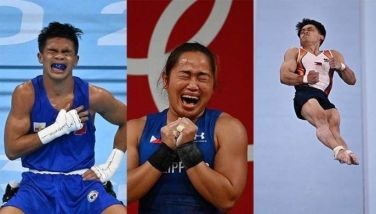Court of Appeals backs judge in Atio hazing trial
MANILA, Philippines — The Court of Appeals (CA) has denied for lack of merit a petition for review of a Manila judge’s refusal to inhibit from trying the case of the fatal hazing of University of Santo Tomas law freshman Horacio “Atio” Castillo III.
The petition was filed by Ralph Trangia, one of several Aegis Juris fraternity members allegedly involved in Castillo’s death.
Trangia sought to inhibit Manila Regional Trial Court Branch 11 Judge Shirley Magsipoc-Pagalilauan, who earlier denied his and his fellow respondents’ bid to dismiss the hazing case against them.
In his petition, Trangia argued that the judge committed grave abuse of discretion amounting to lack or excess of jurisdiction when she denied his motion for inhibition.
He claimed the judge showed partiality in denying his demurrer to evidence despite “a clear showing that the prosecution failed to prove its case.”
In its ruling, promulgated on Sept. 22 and released yesterday, the CA said Trangia “failed to prove his allegation” that Masipoc-Pagalilauan committed grave abuse of discretion when she denied his motion for inhibition.
Citing Section 1, Rule 137 of the Rules of the Court, the CA said voluntarily inhibition is “left to the sound discretion” of the judges concerned whether to sit in a case, as guided by their conscience, based on just or valid reasons.
Bare allegations of bias and prejudice without clear and convincing evidence are not enough to presume that a judge is unable to dispense justice, the CA said.
“Extrinsic evidence must be presented to establish bias, bad faith, malice or corrupt purpose, in addition to palpable error which may be inferred from the decision or order itself,” the CA said.
The CA noted that Trangia alleged that the judge showed partiality in denying his demurrer to evidence and failed to address the issues he raised in his demurrer, which, he claimed shows that the judge would not be able to decide the case soundly and with utmost impartiality.
However, the appellate court said it found sufficient basis for the lower court to deny Trangia’s demurrer, as the prosecution was able to prove all the elements of violations of the Anti-Hazing Law against Trangia.
“Rather it is evident that petitioner’s claim of bias and partiality is merely based on the denial of his demurrer to evidence, which in itself is not sufficient to prove that the court a quo acted with bias, bad faith, malice or corrupt purpose,” the CA said.
The appellate court noted that it cannot support efforts seeking the inhibition of judges that are “unsupported by any legal or factual basis.”
The automatic granting of a motion for voluntary inhibition, the CA said, “would open the floodgates to a form of forum-shopping, in which litigants would be allowed to shop for a judge more sympathetic to their cause.”
This “would prove antithetical to the speedy and fair administration of justice,” the CA said.
- Latest
- Trending
































